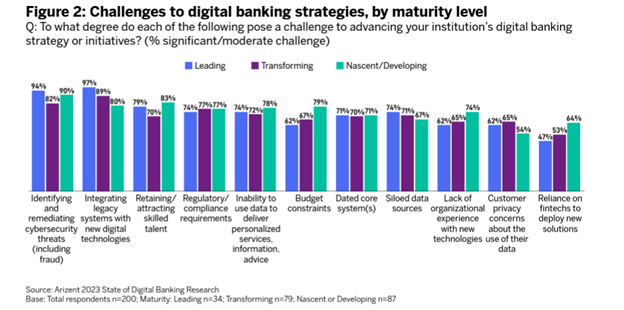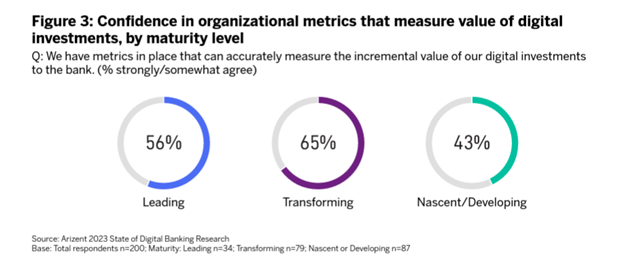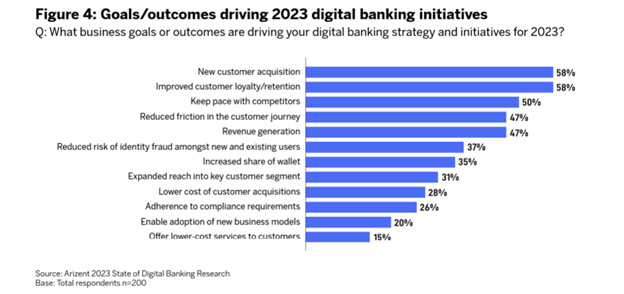
The rapid advancements in technology have significantly impacted the banking industry, compelling FinTech companies to prioritize digital investments as they navigate the digital transformation era. In the face of evolving customer expectations and the emergence of FinTech disruptors, FinTechs recognize the critical importance of excelling in two key areas: cybersecurity and customer experience. The interplay between these dual imperatives has become a defining factor in shaping the future landscape of the industry. Our blog, “The Dual Imperatives: Cybersecurity and Customer Experience in the Digital Transformation of FinTechs,” scrutinizes how FinTech companies are proactively investing in cyber resilience measures to protect against evolving threats while simultaneously focusing on enhancing customer experiences across various integrated digital touchpoints, deducing some key insights from Arizent 2023 State of Digital Banking Research.
The digital transformation of FinTechs has propelled cybersecurity and customer experience to the forefront of their priorities. Recognizing the significance of these dual imperatives helps FinTechs strike a delicate balance between security and user-centricity and position themselves for success in an increasingly digital future.
As the world becomes increasingly interconnected, the threat landscape for FinTechs has expanded, necessitating a relentless focus on cybersecurity controls. Cyberattacks have the potential to disrupt operations, compromise sensitive data, and erode customer trust. Recognizing these risks, FinTechs are investing heavily in robust cybersecurity measures to safeguard their systems and protect customer information from ever-evolving threats. By implementing cutting-edge technologies such as advanced encryption, multi-factor authentication, and artificial intelligence-driven anomaly detection, FinTech companies are fortifying their digital defenses to combat cyber threats effectively.
However, more than cybersecurity is needed to thrive in the digital age. Customers now expect seamless, personalized experiences across all digital touchpoints. The proliferation of smartphones, online banking platforms, and mobile payment solutions has elevated customer expectations for convenience, speed, and tailored services. FinTechs understand the importance of delivering exceptional customer experiences to differentiate themselves in a highly competitive market.
To meet these demands, FinTechs are leveraging innovative technologies, such as artificial intelligence, machine learning, and data analytics, to gain deeper insights into customer behavior and preferences. By harnessing these insights, FinTech companies can personalize their offerings, streamline processes, and provide intuitive digital interfaces that enhance the overall customer journey. Moreover, they are investing in user-friendly mobile applications, responsive websites, and seamless omnichannel experiences to ensure consistent and frictionless interaction with their services.
Amid this digital transformation, FinTechs are reevaluating their strategies to acquire new customers and retain existing ones. They are exploring partnerships and collaborations with other FinTech startups or traditional financial institutions to leverage their agility and technological expertise. FinTech companies are investing in talent acquisition and upskilling their workforce to ensure they have the necessary digital competencies to drive innovation and deliver superior customer experiences.
FinTechs’ Commitment to Digital Transformation: Embracing the Costs and Challenges

Core System Challenges Persist: Impediments to Digital Banking Progress
No financial institution is exempt from the complexities of outdated core operating systems, even those with substantial technology budgets. These institutions often rely on third-party providers for their core systems, which many organizations view as a hindrance to advancing their digital banking initiatives.
A significant majority, 71% of survey respondents, in the survey, perceive these dated core systems as a “moderate” or “significant challenge” to their digital banking strategies. Only a mere 7% of firms do not consider it a challenge. As disclosed by an executive from a community bank with less than $1 billion in assets, renegotiating their core contract has presented an opportunity to upgrade their tools significantly.
Banks and credit unions need help integrating legacy core systems with the new digital technologies they aim to offer customers. A striking 97% of “leading” financial institutions identify this integration as a “significant” or “moderate challenge,” compared to 89% of “transforming” organizations and 80% of “developing/nascent” organizations. Notably, the only challenge that survey respondents perceive as more significant than integrating core systems with new technologies is the ever-present threat of cybersecurity.
Financial institutions are not merely emphasizing the significance of digital banking; they are actively investing in it. While cost-cutting measures are being considered in various areas, reductions in digital investments are rare and seldom proposed. Surprisingly, 42% of respondents anticipate a minimum 10% increase in technology spending within the next 12 months (refer to Figure 1). Less than 15% foresee a decline in tech spending during the same period. Despite the challenges ahead, this indicates a severe and sustained financial commitment to digital transformation.

Cybersecurity Challenges: The Ongoing Concerns for Financial Institutions
Banking executives’ primary concern revolves around cybersecurity, given the significant cybersecurity issues faced by financial institutions in 2022, such as phishing attacks, impersonation attempts, ransomware incidents, and exploitation of software vulnerabilities. Safeguarding against cyber risks, including fraud, represents the most critical challenge for financial institutions in advancing their digital initiatives. Nearly 90% of respondents acknowledge cybersecurity threats as a “moderate” or “significant challenge,” leaving no professionals surveyed dismissing its importance.
The potential risks associated with a financial institution’s digital security not only jeopardize customer data but also pose significant financial losses. Fraudsters have developed sophisticated software explicitly targeting the defenses of these organizations, intensifying banks’ concerns about the far-reaching implications of significant cybersecurity breaches, including reputational and regulatory risks. Recognizing the crucial significance of timely security updates, banks have acknowledged the necessity of addressing this aspect. The Consumer Financial Protection Bureau has emphasized that banks could face legal liabilities if inadequate and delayed security updates lead to customer data compromises.

Metrics Maze: Financial Institutions Navigate the Digital Value
Financial institutions need help in accurately assessing the impact of their digital initiatives. Approximately 54% of respondents “somewhat agree” that they have established metrics to measure the incremental value of their digital investments; among institutions categorized as “transforming,” 65% claim to have appropriate measurement mechanisms in place (refer to Figure 3). In comparison, 56% of “leading” institutions and 43% of “nascent/developing” respondents report having accurate metrics. These metrics are necessary for financial institutions to determine the cost-effectiveness of specific digital strategies per-user.

Embracing Customer-Centricity in FinTech’s Digital Journey
FinTechs prioritize customer retention and attraction in the digital landscape as they shape their strategies. Confidence in measuring the value of digital investments varies across different stages of maturity. Leading financial firms report 56% agreement on having accurate metrics while transforming companies stand at 65% and nascent/developing ones at 43%.
Approximately 60% of respondents in the financial sector focus on acquiring new customers and improving retention. Three-quarters prioritize existing customers, and nearly half aiming to reduce friction in the customer journey. Key customer segments for investment in online and mobile channels include existing customers (74%), high-net-worth individuals (67%), and younger generations (62%).
FinTech companies recognize the importance of catering to older customers who have transitioned to digital channels. Those with significant digital progress have the capability to efficiently target specific customer segments and handle multiple digital initiatives simultaneously. Within the FinTech realm, regional firms with assets between $50 billion and $100 billion have successfully acquired customers digitally, eliminating the need for physical visits.

Key Insights, Opportunities, and Challenges for FinTechs Navigating the Digital Frontier: Unleashing Cognitive, Affective, and Social Experiences while Mitigating Risk
FinTechs boldly venture into the digital frontier, facing numerous challenges and disrupting the sales of banking products through their customer-centric approach and rapid innovation. These agile and innovative startups leverage leading-edge technology, unencumbered by legacy architecture and only partially subject to conventional banking regulations. With lean operations and specialized staff, they rely on the digital realm, requiring minimal physical infrastructure.
As customers embrace change like never before, evolving customer behavior presents new insights, opportunities, and challenges for FinTechs. By harnessing cognitive experiences, FinTechs tap into the power of advanced technologies to understand and anticipate customer needs. Affective experiences emerge, enabling FinTechs to deliver personalized and emotionally engaging interactions. Social experiences foster a sense of community and customer collaboration, enhancing loyalty and trust.
However, amidst these opportunities, FinTechs must also prioritize risk mitigation. As they navigate the digital frontier, ensuring robust security measures and compliance with regulatory frameworks is paramount. By implementing robust risk management strategies, FinTechs can build trust and safeguard their customers’ sensitive financial information.
In this dynamic landscape, FinTechs are poised to revolutionize the financial industry. By embracing cognitive, affective, and social experiences while effectively mitigating risks, they can unlock new possibilities and create a truly transformative digital future.
Let’s discuss the scope of how customers are open to change as never before and how the evolving customer behavior presents new insights, opportunities, and challenges for the FinTechs navigating the digital frontier.
Expanding Banking Services Enabled by Digital Innovations
FinTechs are at the forefront of expanding banking services through digital innovations. Initiatives like buy now, pay later, real-time payments, fraud mitigation software, and real-time data analytics are top priorities for FinTech executives. Additionally, many FinTechs are partnering with other financial technology companies, leveraging their expertise to adopt new technologies quickly and cost-effectively.
Implementation and Analysis Hurdles
FinTechs still face hurdles despite their agility when implementing and analyzing digital improvements. Outdated core systems can pose challenges, limiting their ability to enhance or customize digital offerings. Furthermore, understanding the impact of new features and enhancements on customer experience can be a complex task for FinTechs.
Customer Experience as a Driving Force
Customer experience takes center stage for FinTechs, who aim to revolutionize interactions through mobile technology. Acquiring and retaining customers remain the primary drivers of digital banking strategies for FinTechs. As FinTechs progress in their digital journey, they focus on developing personalized tools for high-net-worth individuals and small businesses.
Cybersecurity as a Paramount Concern
Ensuring robust cybersecurity measures is a top priority for FinTechs of all sizes. The prevalence of hacking, phishing, and identity theft incidents drives FinTechs to strengthen security efforts. Collaboration with other FinTechs for cybersecurity controls, including secure ID verification and advanced security systems, takes precedence over other digital priorities.
Digital Transformation as a Never-Ending Journey
FinTech leaders understand that digital transformation is an ongoing journey without a definitive endpoint. Adapting to the rapidly changing technology landscape and evolving customer demands is a continuous process for FinTechs. More digitally capable FinTechs prioritize strategies that enhance customer experience, such as advanced security systems and innovative online lending solutions.
Conclusion
In conclusion, the dual imperatives of cybersecurity and customer experience shape the digital transformation of FinTechs. Financial institutions, including FinTechs, recognize the need to cut overall costs while prioritizing technology investments to stay competitive. Increased technology spending, particularly in cybersecurity measures, reflects the critical priority of protecting customer data and funds.
However, accurately measuring the impact of digital investments remains a challenge for many FinTechs. These institutions must ensure they have proper measurement tools to gauge their digital services’ incremental value.
Customer-centricity is a driving force for FinTechs, focusing on enhancing customer experience through tools and services such as financial wellness trackers and accessible credit-score histories. FinTechs can accurately predict customer behavior and offer streamlined products and services by refining their processes of collecting and analyzing customer data.
To navigate the digital frontier successfully, cutting-edge FinTech firms leverage MSys’ comprehensive suite of FinTech services and technological expertise. From loyalty programs and payment processing to digital asset management and risk analysis, MSys provides end-to-end support, reducing cost overruns and inefficiencies.
With MSys as their trusted partner, FinTechs can optimize their business endeavors, ensuring seamless financial services while prioritizing technical ingenuity and customer support.